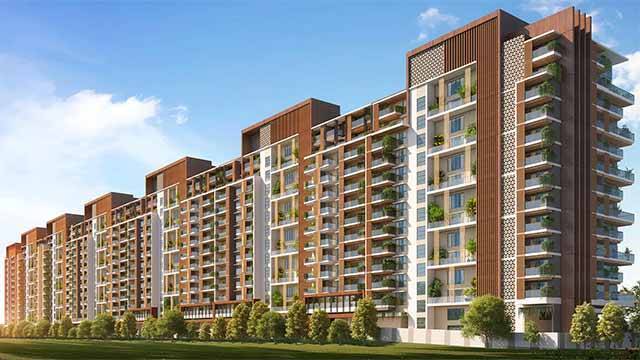As India gears up for the 2024 Lok Sabha elections result, the real estate sector stands at a pivotal juncture, poised to witness significant shifts in market dynamics and policy landscapes. The 2024 general election exit polls indicate a strong likelihood of Prime Minister Narendra Modi securing a third term, with the BJP-led NDA expected to win a substantial majority in the Lok Sabha. This anticipated political stability has brought renewed optimism within the real estate sector in India. Stakeholders are hopeful that long-standing demands, such as granting industry status to the real estate sector, simplifying regulatory processes, revising rules, and increasing the cap on affordable homes, will finally be addressed.
Historical Trends:
ANAROCK Group's data reveals a remarkable correlation between Lok Sabha elections and India's residential real estate market. Analysis of past elections, particularly in 2014 and 2019, highlights a surge in residential real estate activity coinciding with these political events. In 2014, approximately 345,000 housing units were sold across the top seven cities, accompanied by a record number of new property launches. Similarly, 2019 witnessed increased sales volume and new launches, following a period of stagnation.
Policy Reforms and Market Dynamics:
The intervening years between 2016 and 2019 witnessed significant policy reforms, including Demonetization, RERA, and GST. This underscores the transformative impact of these reforms, transitioning the real estate sector from a largely unregulated domain to a more structured and transparent market. The post-reform era witnessed a decline in unreliable developers, restoring buyer confidence and paving the way for sustained growth.
Projections for 2024:
Experts anticipate another peak in housing sales and new launches in 2024. With key regulations firmly in place and economic indicators pointing towards stability, the stage is set for continued growth in the real estate sector. ANAROCK Chairman, Anuj Puri, highlights the confluence of factors such as strong GDP growth predictions, controlled inflation, and high homebuyer optimism, shaping a positive outlook for the market. The policy expectations include.
Policy Expectations:
The stakeholders in the real estate sector articulate their policy expectations from the incoming government. Foremost among these demands is the grant of industry status for the real estate sector, a move that could catalyze growth and align with the government's agenda of affordable housing for all. Additionally, stakeholders seek revisions in regulations, including definitions and caps for affordable housing, and measures to stimulate growth, such as GST input tax credit reforms. The major policy expectations include;
Granting of Industry Status
The real estate sector is pushing for recognition as an industry, which would provide easier access to institutional finance, reduce borrowing costs, and enhance market credibility. This status is viewed as critical for stimulating investment, boosting employment, and supporting the national goal of providing housing for all.
Reintroduction of Interest Subvention Scheme
Stakeholders advocate for the revival of the interest subvention scheme to make housing loans more affordable, especially for mass housing projects. This would alleviate the financial burden on homebuyers, encourage home ownership, and support housing market growth.
Redefinition of Affordable Housing
Currently, affordable housing is defined as a home with a maximum area of 90 square meters and priced up to Rs 45 lakh. The industry proposes increasing these limits to better reflect market conditions and accommodate a larger segment of the population. This redefinition is expected to expand the scope of affordable housing, making it accessible to more people and stimulating demand in this crucial segment.
Implementation of Single Window Clearance System
The sector is calling for a single window clearance system to streamline the approval process for real estate projects. This system would reduce the time and complexity involved in obtaining various permissions, leading to faster project completions, lower holding costs for developers, and increased investment.
Revision of GST Input Credit Rules
There is a strong demand for the revision of GST input credit rules, which were curtailed in 2019. Reinstating input tax credit (ITC) on GST would lower the overall tax burden on developers, reduce costs, and ultimately benefit homebuyers through more competitive pricing.
Increased Home Loan Interest Rate Rebates
Enhancing rebates on home loan interest rates is another key expectation. Increasing these rebates would make housing loans more affordable, encouraging more people to invest in property and stimulating demand in the real estate market.
Navigating the Future:
As the political landscape evolves post-election, stakeholders must remain agile and adaptive to potential changes in policy and market conditions. Leveraging ANAROCK's data-driven insights, industry players can formulate informed strategies to navigate the evolving real estate landscape and capitalize on emerging opportunities. By fostering collaboration and innovation, the sector can position itself for sustained growth and resilience in the years ahead.
As India prepares for the 2024 Lok Sabha elections results stakeholders can anticipate shifts in the landscape and prepare accordingly. With the anticipated political stability under Modi 3.0, the sector is hopeful that these reforms will gain traction and be effectively implemented.
Images forbes.com/, dailyexcelsior.com









.png)